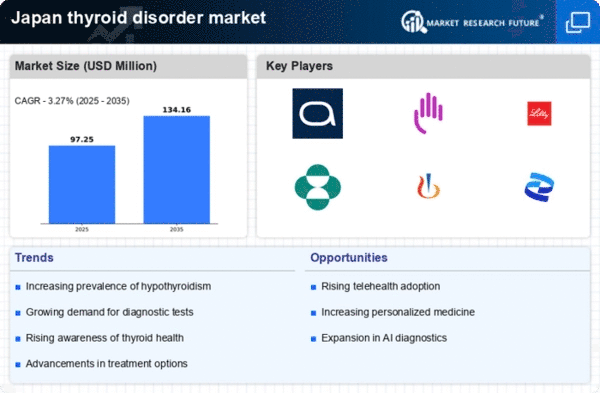Rising Demand for Preventive Healthcare
There is a growing trend towards preventive healthcare in Japan, which is influencing the thyroid disorder market. As individuals become more health-conscious, there is an increased focus on regular screenings and preventive measures to detect thyroid disorders early. This shift in consumer behavior is likely to drive demand for diagnostic tests and monitoring solutions within the thyroid disorder market. Additionally, public health campaigns aimed at educating the population about thyroid health are expected to further encourage proactive health management. The emphasis on prevention may lead to a larger patient base seeking early intervention, thereby contributing to the overall growth of the thyroid disorder market.
Integration of Telemedicine in Healthcare
The integration of telemedicine into the healthcare system in Japan is transforming the thyroid disorder market. Telehealth services are becoming increasingly popular, allowing patients to consult with healthcare providers remotely. This is particularly beneficial for individuals living in rural areas, where access to specialized care may be limited. The convenience of telemedicine can lead to increased patient engagement and adherence to treatment plans, which is crucial for managing thyroid disorders effectively. As telehealth continues to evolve, it is expected to play a significant role in expanding the thyroid disorder market by providing patients with easier access to care and support.
Increasing Prevalence of Thyroid Disorders
The thyroid disorder market in Japan is experiencing growth due to the rising prevalence of thyroid-related conditions. Recent data indicates that approximately 10% of the Japanese population is affected by some form of thyroid disorder, with women being disproportionately impacted. This increasing incidence is likely to drive demand for diagnostic and therapeutic solutions within the thyroid disorder market. Furthermore, the aging population in Japan, which is projected to reach 36% of the total population by 2040, may contribute to a higher incidence of thyroid disorders, as these conditions are more common in older adults. As awareness of thyroid health continues to grow, healthcare providers are expected to focus more on screening and treatment options, thereby expanding the thyroid disorder market in Japan.
Government Initiatives and Healthcare Policies
Government initiatives aimed at improving healthcare access and quality in Japan are likely to bolster the thyroid disorder market. The Japanese government has implemented various health policies that promote early detection and management of chronic diseases, including thyroid disorders. For instance, the Health Promotion Law encourages regular health check-ups, which can lead to earlier diagnosis of thyroid conditions. Additionally, the introduction of subsidies for thyroid-related treatments may enhance patient access to necessary medications and therapies. These initiatives not only aim to improve public health outcomes but also stimulate growth in the thyroid disorder market by increasing the number of patients seeking treatment and management options.
Technological Advancements in Treatment Options
the thyroid disorder market is expected to grow due to ongoing technological advancements in treatment options.. Innovations such as minimally invasive surgical techniques and the development of novel pharmaceuticals are enhancing the efficacy of thyroid disorder management. For example, the introduction of targeted therapies and biologics has shown promise in treating specific thyroid conditions, potentially improving patient outcomes. Moreover, the market for thyroid medications in Japan is projected to reach approximately $1.5 billion by 2026, reflecting the increasing demand for effective treatment solutions. As healthcare providers adopt these advanced technologies, the thyroid disorder market is likely to expand, offering patients more effective and personalized treatment options.
















